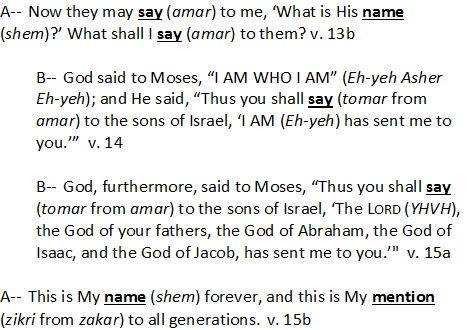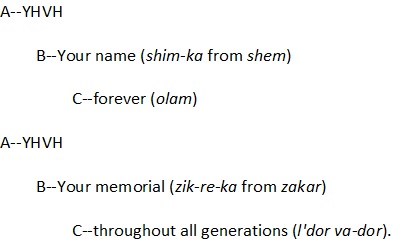PSALM 135:13
EXODUS 3:13-15

Explaining the Chiasms
In Deuteronomy 26:1-15, there are embedded three “confessions,” required to be recited by all Israel upon entry into the promised land. Within those three confessions, there are seven instances of YHVH (Yehovah), to be spoken by every Israelite. This raises a question: why is the name, YHVH, written as LORD in most translations of Scripture?
The translators speak for themselves. These explanations are generally offered in the prefaces to our various Bibles. Let’s take a look at several of these explanations.
NASB– “There is yet another name which is particularly assigned to God as His special or proper name, that is, the four letters YHWH (Exodus 3:14 and Isaiah 42:8). This name has not been pronounced by the Jews because of reverence for the great sacredness of the divine name. Therefore, it has been consistently translated LORD. The only exception to this translation of YHWH is when it occurs in immediate proximity to the word Lord, that is, Adonai. In that case it is regularly translated GOD in order to avoid confusion. It is known that for many years YHWH has been transliterated as Yahweh, however no complete certainty attaches to this pronunciation.”
NIV (1983)[1]— In regard to the divine name YHWH, commonly referred to as the Tetragrammaton, the translators adopted the device used in most English versions of rendering that name as “Lord” in capital letters to distinguish it from Adonai, another Hebrew word rendered “Lord,” for which small letters are used. Wherever the two names stand together in the Old Testament as a compound name of God, they are rendered “Sovereign Lord.”
NLT– We have rendered the tetragrammaton (YHWH) consistently as “the Lord,” utilizing a form with small capitals that is common among English translations. This will distinguish it from the name ’adonai, which we render “Lord.” When ’adonai and YHWH appear in conjunction, we have rendered it “Sovereign Lord.” This also distinguishes ’adonai YHWH from cases where YHWH appears with ’elohim, which is rendered “Lord God.” When YH (the short form of YHWH) and YHWH appear together, we have rendered it “Lord God.” The Hebrew word ’adon is rendered “lord,” or “master,” or sometimes “sir.”
In looking at these statements, the reasoning behind using “LORD” in place of “YHVH” is expressed as a matter of “consistency”–in the case of the NASB and NLT, in apparent alignment with Jewish practice, and in the case of the NIV, as a matter of “adoption,”–“the translators adopted the device used in most English versions. . .” In no case did the translators reference any type of guidance from the Biblical text or cite a Biblical reference prohibiting the use of YHVH. Therefore, I conclude that the omission or masking of God’s actual name, YHVH, with a title, LORD, is a human practice that has become a tradition among translators, not something forbidden by God Himself. Question: if there’s no prohibition against using God’s name, are we encouraged by Scripture to write it, or to say it?
Psalm 135:13 is, in itself, a literary arrangement that sheds light on this question. In the Hebrew, the word, YHVH, repeats. This is followed by the alignment of the phrase, Your Name, shim-ka, to Your memorial, zik-re-ka. Finally, forever, olam, aligns to “throughout all generations” (l’dor va-dor). The first and third parallels are clear. What, however, is the connection between Your Name and Your memorial?
The key to answering that lies in the meaning of “memorial.” The Hebrew translated as “memorial” is zik-re the root of which is zakar. Zakar is a word we’ve encountered in prior lessons. When we were discussing circumcision, this word appeared in Genesis 17:10 and 12, translated as “male.” We also found that the word means “remember”–an act of pointing to someone or something not physically present. There is a verse in the Torah that reinforces this but also reveals another meaning of zakar. In Genesis Chapter 40, Joseph was imprisoned along with Pharoah’s cupbearer and baker. Both came to Joseph to interpret their dreams. After giving a favorable interpretation that predicted the cupbearer’s exoneration, Joseph asked him to do something upon his release from prison in verse 14: “Only keep me in mind when it goes well with you, and please do me a kindness by mentioning me to Pharaoh and get me out of this house.” The phrase “keep me in mind” is a translation of zakar, an act of remembering with one’s mind, pointing toward someone, Joseph, who would not be physically present with the cupbearer once he was released from prison. There is another use of zakar in that same verse. Do you see it? It is translated as “mention.” Joseph not only wanted the cupbearer to remember him with his mind, but to say something to Pharaoh on his behalf, to mention him to Pharaoh. This would be done with the mouth.
Before we return to Psalm 135:13, it is interesting to note that the verse is strongly reminiscent of a verse in the Book of Exodus. In Chapter 3, Moses had a question for God. As he conversed with the angel of God at the burning bush, he wanted to know what to say (amar) to the Israelites if they asked the name of Him with Whom he spoke. The conversation between Moses and God takes the form of a literary structure:
A– Now they may say (amar) to me, ‘What is His name (shem)?’ What shall I say (amar) to them? v. 13b
B– God said to Moses, “I AM WHO I AM” (Eh-yeh Asher Eh-yeh); and He said, “Thus you shall say (tomar from amar) to the sons of Israel, ‘I AM (Eh-yeh) has sent me to you.’” v. 14B
B– God, furthermore, said to Moses, “Thus you shall say (tomar from amar) to the sons of Israel, ‘The Lord (YHVH), the God of your fathers, the God of Abraham, the God of Isaac, and the God of Jacob, has sent me to you.’” v. 15a
A– This is My name (shem) forever, and this is My mention (zikri from zakar) to all generations. v. 15b
The conversation above is initiated by the question of what to say God’s name is. In the verses labeled “A,” name (shem) corresponds to name (shem) and say (amar) to mention (zakar). Moreover, the entire flow of the literary structure is punctuated by the word “say” (amar). This points towards God’s answer in verse 14 and 15a, in which there is a correspondence between the phrase “thus you shall say”. In addition, the expression, Ehyeh Asher Ehyeh, first stated in full and then abbreviated as Ehyeh in verse 14, point to God’s most essential name, YHVH, in verse 15a. Importantly, the word zakar is translated here as mention because the entire discourse is centered on saying the Name. In fact, beginning in verse 13, the word amar is repeated five times through the end of verse 15. Clearly, this Scripture is talking about speaking the name YHVH.
Take note that line 15b is virtually identical to Psalm 135:13. The psalmist has very likely quoted the Torah. If through the reading of the Torah and the examination of the literary structure above we discern that zakar (zikri) means in that case, mention, then it is reasonable to assign that meaning to the same word in Psalm 135:13.
This finding strongly indicates that God wants His name, YHVH (Yehovah), to be spoken.
[1] The 2011 NIV Preface has omitted this reference to its treatment of the Name, YHVH.


